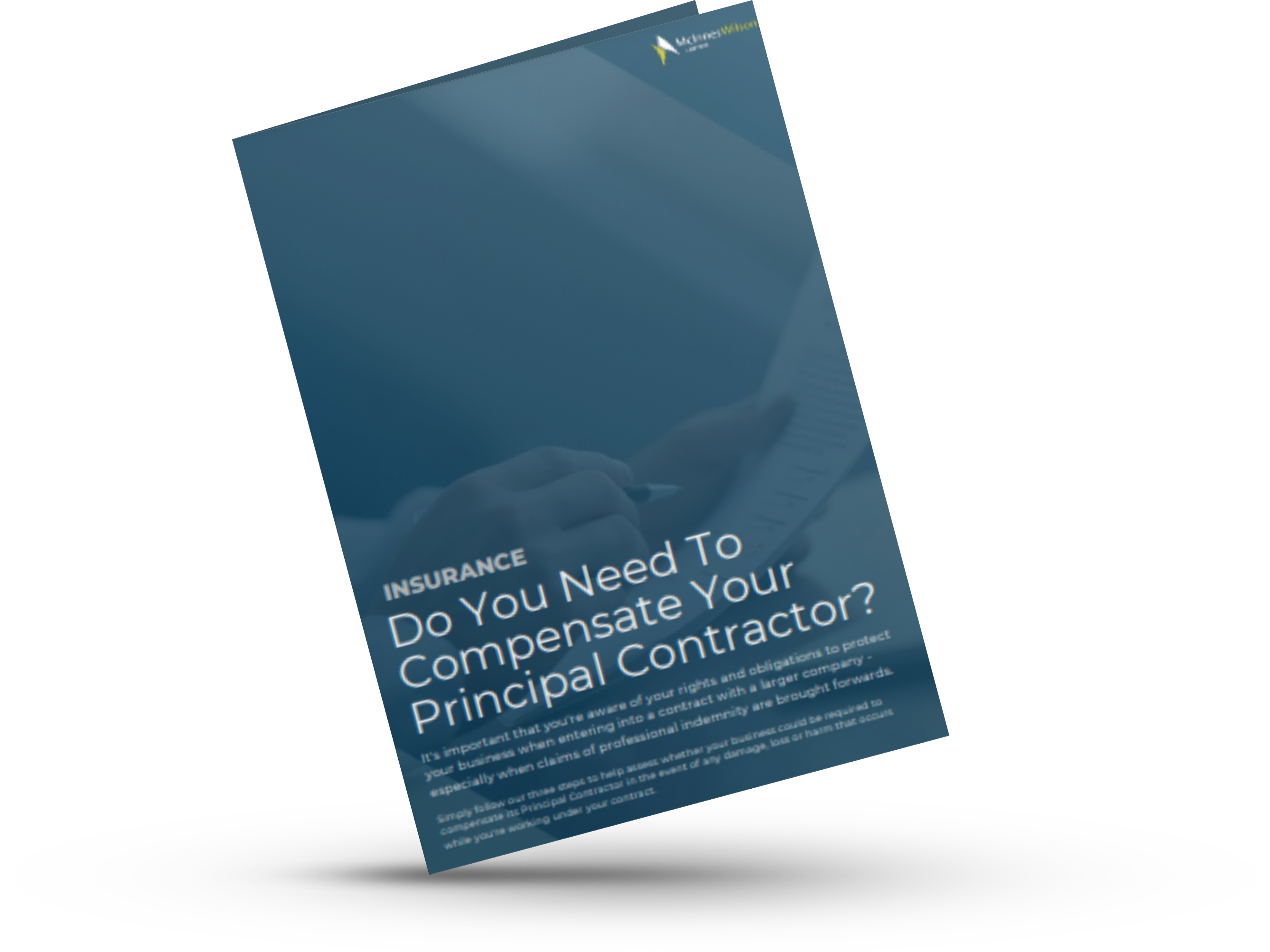Often, as a small business owner, you may be looking at entering into a contract with a much larger business. Usually in these circumstances, you'll be given little to none bargaining power when signing, which can potentially see you suffering financially in the event of any loss or injury occurring whilst under contract.
So, what rights and obligations should be in your contract to make sure you and your business will be protected in the event a claim is brought against your Principal Contractor?
We will assist in answering this by going over some of the key points to look out for in your contract and what steps you should take to best ensure you fulfil your obligations.
Contractual indemnities
A contract will usually include a clause that includes words to the effect of the Subcontractor will indemnify the Principal Contractor for a claim. An example of such a clause is as follows:
“Clause 15 – Indemnity
15.1 The Subcontractor agrees to indemnify the Principal Contractor in respect of all loss suffered or incurred in connection with any death or personal injury caused by the Subcontractor.”
This clause means that the Subcontractor will compensate the Principal Contractor for any harm or loss suffered, which, in most cases, will be a personal injuries claim brought by the injured person against your Principal Contractor.
Of course, parties to a contract are entitled to agree that one will assume the liability on behalf of another. Usually, in such a commercial context, the Principal Contractor will also seek this from its Subcontractors.
If such a clause arises in your contract, ensure you can have a proportionality clause in place. An example of a proportionality clause would follow the above clause:
“Clause 15 – Indemnity
15.1 The Subcontractor agrees to indemnify the Principal Contractor in respect of all loss suffered or incurred in connection with any death or personal injury caused by the Subcontractor except to the extent that loss is attributable to the negligence of the Principal Contractor.”
If no such proportionality clause is present, the Principal Contractor may be entitled to seek that you compensate them for any loss, including caused by their own negligence.
In order to best protect yourself if this situation arises, you should ensure you take out a Public Liability policy insurance, which also includes a Principal’s Extension.
agreement to insure
It is not uncommon for such a clause to state that you must take out certain insurance policies. The following is an example of this clause:
“16 – Insurance
16.1 The Subcontractor must have in place at the commencement of the contract and maintain during the term of the contract the following insurance policies:
- Workers’ Compensation Insurance in the amount specified in the Schedule;
- Public Liability Insurance in the amount specified in the Schedule
- Professional Indemnity Insurance in the amount specified in the Schedule.”
This current clause is simply an obligation to have the stated insurance policies in place.
However, there may be a further obligation the Principal Contractor has requested in this clause. This could be either to “list the Principal Contractor as a named Insured” under your insurance policy or to “note the interests of the Principal Contractor” on your policy.
If this wording is present, it means your Principal Contractor is entitled to claim under your insurance policy. This usually is a business decision on the part of the Principal Contractor to keep their claims history and premiums low and to avoid paying their own policy excess, which is likely a significantly higher amount than that of the Subcontractor.
It is important that if there is the obligation to name or note your Principal Contactor under your insurance policy, that you contact your insurance company or broker to make sure the Principal Contractor is either named on your policy schedule or you have a Principal’s Extension in place in your policy.
A failure to do so may result in the Principal Contractor suing your company for breach of contract. The remedy for breach of such a clause is the amount of indemnity that policy would have offered less any applicable excess. This applies regardless of whether the Principal Contractor has their own policy, which covers the loss anyway!
How Can I Avoid My Principal Contractor Claiming Under My Insurance Policy ?
There are a few ways that you can try to avoid being in a situation where you have to cover the Principal Contactor for a personal injury in a circumstance where your company is not otherwise legally responsible.
You can try the following steps to ensure your policy premiums are kept down and you have a low claims history on your record:
- As identified above, ensure a proportionality clause is present in any indemnity clause;
- Try and avoid any obligation to name the Principal Contractor on your insurance policy;
- If there is no proportionality clause, or the obligation to name the Principal Contractor is included in your agreement to insure clause, see if you can implement a high policy excess so your Principal Contractor may not find it commercial to claim under your policy; and
- Avoid agreeing to pay any excess on the part of the Principal Contractor if you can!
If you are unsure whether you may be required to provide compensation to your Principal Contractor, download our 3 step flow chart to help answer your question.
If you have any further questions about your insurance position when entering into a contract, please contact David Jesser on (07) 3231 0641 or fill out the enquiry form below for an obligation-free appointment.



